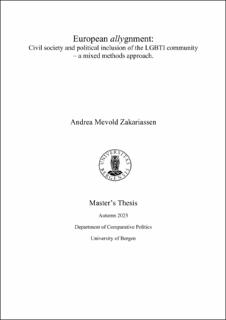European allygnment: Civil society and political inclusion of the LGBTI community – a mixed methods approach.
Master thesis

View/
Date
2023-12-04Metadata
Show full item recordCollections
- Master theses [117]
Abstract
The quest for political inclusion of the LGBTI community is complicated. In the last decades, more queer electoral candidates have been elected, queer rights have increased, and general discrimination decreased. Simultaneously, the LGBTI civil society is increasingly faced with restrictive legislation, attacks on their activists and organizations, and violence during peaceful Pride Marches. In this thesis, I research the role of civil society in promoting the political inclusion of the LGBTI community in the European context. I base this study on theory about democratic representation and on civil society – specifically drawing on the Social Origins of Civil Society. Employing a mixed method research design, I hypothesize that descriptive representation of the LGBTI community is positively correlated with higher levels of civil society participation, and with the presence of nationalistic ideology in government. These hypotheses are researched through a panel analysis. Furthermore, I hypothesize that interest representation through the transnational queer civil society is challenged by the erosion of democracy – and that the challenges faced are similar irrespectively of domestic context. These latter hypotheses are researched through in-depth interviews with respondents from the European transnational civil society. The findings from the panel analysis indicate that civil society participation and a government promoting nationalistic ideology positively correlate with descriptive representation of the LGBTI community. The results from the in-depth interviews indicate that the erosion of democracy, right-wing populism, and lack of descriptive representation pose challenges for civil society to promote the interests of the LGBTI community. Mechanisms surrounding the European Union constitute both challenges and assistance for the queer civil society. My findings indicate that the challenges are similar, regardless of domestic context. I conclude that civil society arguably is important in the explanation of political inclusion of the LGBTI community – as it sometimes is one of the only available democratic channels for voicing the collective needs of the queer community. I argue that the queer civil society is particularly important in cases where a government promotes a nationalistic ideology. Lastly, I conclude that the intrinsic, carefully aligned allyship in the transnational queer civil society itself constitutes a vital role in the promotion of political inclusion of the LGBTI community.